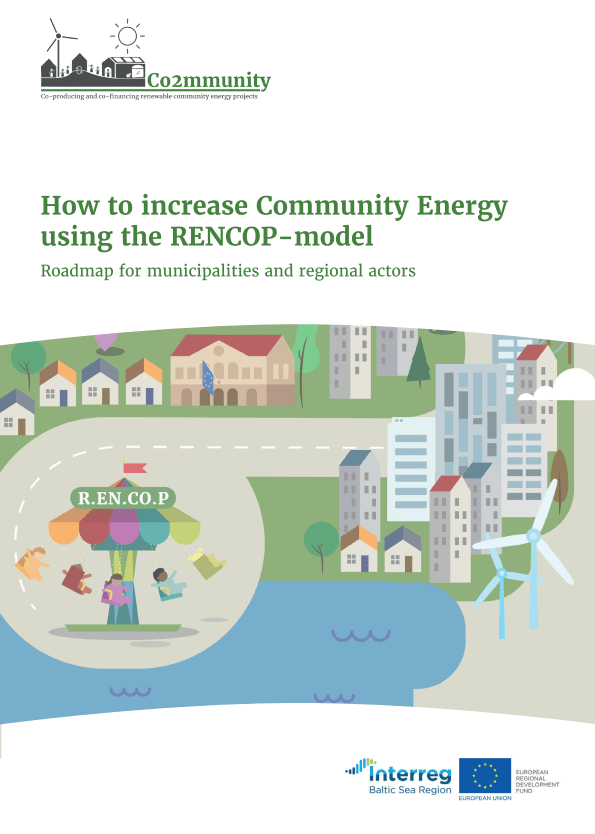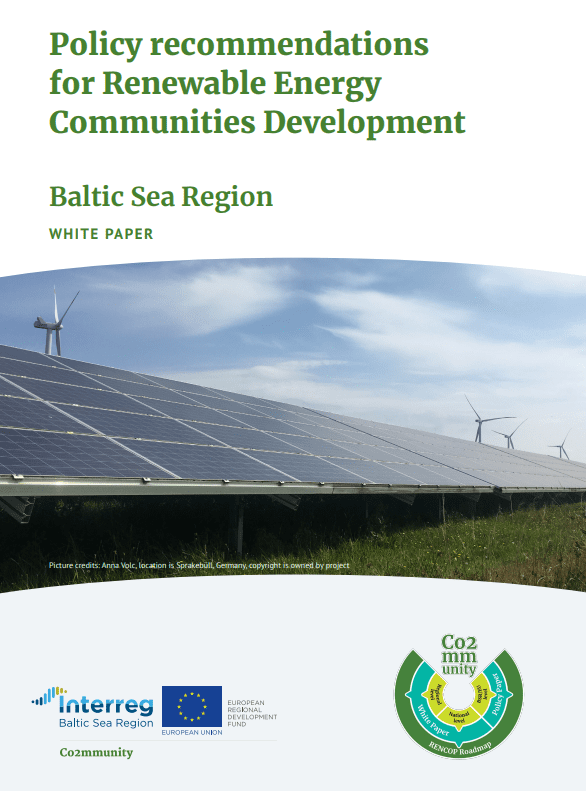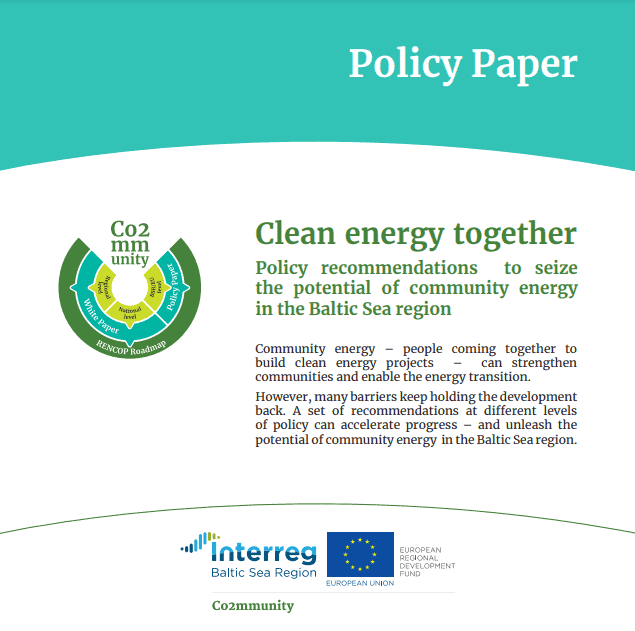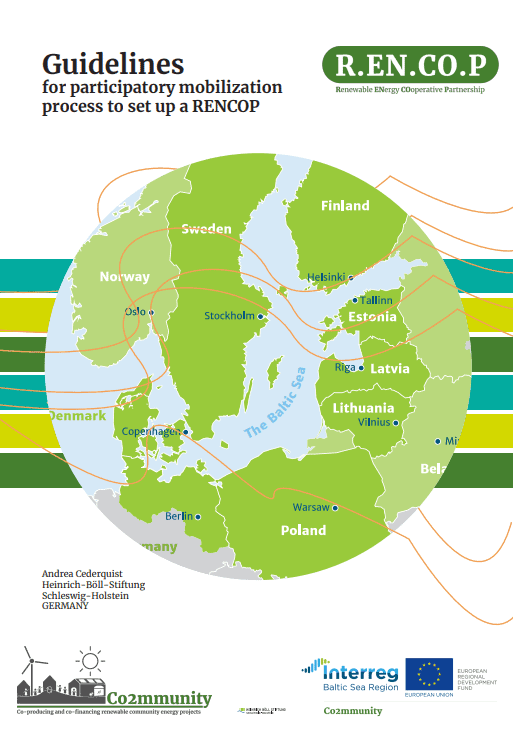Co2mmunity
Community energy puts citizens at the heart of the energy production system. Local communities play an active role in the production of renewable energies from local sources such as wind, solar, biomass, hydropower, or geothermal. Together, citizens co-finance, co-develop, and co-operate renewable energy plants, and foster sustainable energy distribution, like local heating networks or biogas filling stations. Through active communication, transparent decision-making, and local benefit sharing community energy projects have high social acceptance. Consequently, fostering community energy projects is highly promising for increasing the share of renewable energies in the Baltic Sea region. This also contributes to the European Union’s vision of providing Clean Energy for all Europeans.
There is currently a knowledge gap concerning community energy (CE) in the Baltic Sea region. Co2mmunity worked to fill this gap by providing a solid and substantial knowledge base for CE stakeholders across the Baltic Sea. Thanks to the shared experience from the project partners, the project enhanceed the institutional capacities of municipalities, institutions responsible for regional energy planning, political decision-makers, and energy and citizen’s associations for facilitating community energy projects.
Budgets
in numbers
-
3.15MillionTotal
-
2.45MillionErdf
-
0.00MillionEni + Russia
-
0.00MillionNorway
Achievements
Transnational exchange to foster community energy
The Co2mmunity partners organised Renewable Energy Co-operative Partnerships (RENCOPs) in their respective home countries. These local networks are comprised of communities, coordinators, and experts, which include citizens, authorities, businesses, and academia. Every RENCOP is different, but they all worked to implement renewable energy projects which would be unmanageable by one person or group alone. They could learn about the opportunities and pitfalls of cooperative renewable energy project development.
The project partners have initiated and managed nine RENCOPs in total in Estonia, Denmark, Finland (two), Germany, Latvia, Lithuania, Poland, and Sweden. Depending on conditions in the specific region, the RENCOPs have used different strategies and focus areas. Examples of this are solar panels for housing cooperatives developed in Sweden and Estonia as well as the jointly purchased heat pumps in Denmark.
The pilot projects are instructive examples for the participatory mobilisation process according to RENCOP and for profitable renewable energy on a community level. Thanks to RENCOPs, citizens can ultimately have access to knowledge that allows them to take the energy transition into their own hands.
Outputs
Roadmap on how to increase community energy using the RENCOP model

White Paper: policy recommendations to support community energy

Policy Paper for energy stakeholders in the Baltic Sea region

Guidelines for participatory mobilisation process to set up a RENCOP and CE Partner Agreement

Project Stories
-
21.12.2016
Power to the people
The Co2mmunity project wants to bring forward renewable community energy. The project coordinator at Kiel University explains what this is all about. Co2mmunity is one out of 39 cooperation projects which are starting their work for a more innovative, more sustainable and better accessible Baltic Sea region in autumn 2017.Read full story
Partners
Kiel University
- TownKiel
- RegionKiel, Kreisfreie Stadt
- CountryGermany
- RepresentativeFabian Faller
- Phone
- E-Mail
- Web
SUCCEEDED by PP17 (01.01.2018) Green City Energy AG
- TownMunich
- RegionMünchen, Kreisfreie Stadt
- CountryGermany
- RepresentativePeter Keller
- Phone
- E-Mail
- Web
Heinrich-Böll Foundation Schleswig-Holstein e.V.
- TownKiel
- RegionKiel, Kreisfreie Stadt
- CountryGermany
- RepresentativeDoris Lorenz
- Phone
- E-Mail
- Web
Municipality of Middelfart
- TownMiddelfart
- RegionFyn
- CountryDenmark
- RepresentativeMorten Mejsen Westergaard
- Phone
- E-Mail
- Web
Tartu Regional Energy Agency
- TownTartu
- RegionLõuna-Eesti
- CountryEstonia
- RepresentativeMartin Kikas
- Phone
- E-Mail
- Web
Aalto University Foundation sr
- TownAalto
- RegionHelsinki-Uusimaa
- CountryFinland
- RepresentativeRaimo Lovio
- Phone
- E-Mail
- Web
Green Net Finland
- TownVantaa
- RegionHelsinki-Uusimaa
- CountryFinland
- RepresentativeSuvi Häkämies
- Phone
- E-Mail
- Web
Regional Council of South Ostrobothnia
- TownSeinäjoki
- RegionEtelä-Pohjanmaa
- CountryFinland
- RepresentativeJaakko Hallila
- Phone
- E-Mail
- Web
Thermopolis Ltd - Energy Agency of South Ostrobothnia
- TownLapua
- RegionEtelä-Pohjanmaa
- CountryFinland
- RepresentativeMatti Alakoskela
- Phone
- E-Mail
- Web
Riga Planning Region
- TownRiga
- RegionRīga
- CountryLatvia
- RepresentativeEmils Rode
- Phone
- E-Mail
- Web
Kaunas Regional Energy Agency
- TownKaunas
- RegionKauno apskritis
- CountryLithuania
- RepresentativeFeliksas Zinevicius
- Phone
- E-Mail
- Web
Lithuanian Energy Institute
- TownKaunas
- RegionKauno apskritis
- CountryLithuania
- RepresentativeMantas Marciukaitis
- Phone
- E-Mail
- Web
Foundation for Sustainable Energy
- TownWarsaw
- RegionMiasto Warszawa
- CountryPoland
- RepresentativeMagdalena Karlikowska
- Phone
- E-Mail
- Web
Energy Agency for Southeast Sweden
- TownVäxjö
- RegionKronobergs län
- CountrySweden
- RepresentativePierre Ståhl
- Phone
- E-Mail
- Web
Lund University
- TownLund
- RegionSkåne län
- CountrySweden
- RepresentativeTeis Hansen
- Phone
- E-Mail
- Web
Green City Experience GmbH
- TownMünchen
- RegionMünchen, Kreisfreie Stadt
- CountryGermany
- RepresentativePeter Keller
- Phone
- E-Mail
- Web
-
Project managerRobert HassinkKiel University
-
Legal representativeLinda PialekKiel University
-
Financial managerLinda PialekChristian-Albrechts-Universität zu Kiel; Service Centre for Research, IT and Strategic Innovation
-
Communication managerGerlind Wagner-VogelKiel University



